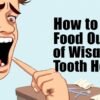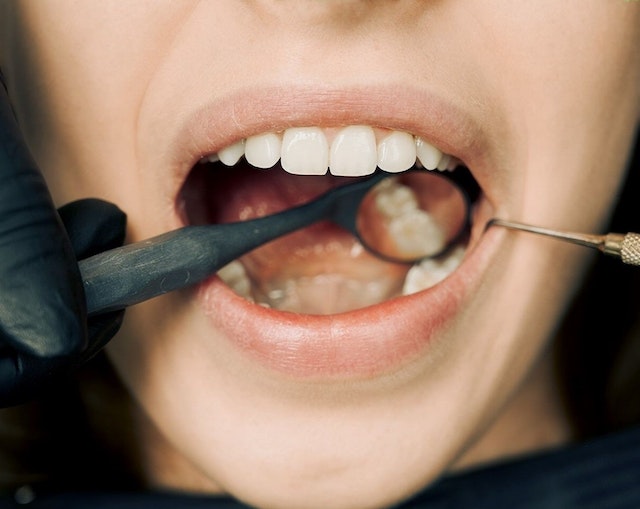Oral and overall health has a direct relationship. Bleeding gums, cavities, tooth loss, and oral infections do not just disturb our food choices. Oral health problems can deteriorate overall health, as weaker immunity, digestive system disturbances, and respiratory complications correlate with oral hygiene problems and decaying teeth.
So, do not ignore any uncomfortable, unusual, and persistent indication or change in your teeth and gums. And remember that cavities and tooth pain are not the only oral health complication. Observe other signs like bad breath, inflammation or bleeding in gums, mouth sores, receding gums, and tooth sensitivity. If you suffer from any such issue, see a dentist. Timely consultation with a dentist can save you overwhelming expenditure and damage to your teeth or gums.
Read the following passages to understand common signs and symptoms of decaying oral health.
1. Persistent pain in teeth:
Persistent pain in teeth is not an ignorable sign. It can indicate teeth infection, cracks in teeth, or dental caries. Toothache can occur when tooth infection or cavities damage the outer layers and pass to the soft interior pulp of your teeth. Sensory nerves connected to the pulp send signals indicating something is wrong.
Dental procedures like teeth bleaching and polishing, root canal, tooth crowning, artificial tooth insertion, or mal-positioning of artificial teeth can also cause toothache. Sometimes, wearing teeth aligners and braces also causes pain. So, if metal braces do not suit, try other alternatives like clear braces.
Clear braces made of ceramic material are more comfortable than metallic braces. But it’s best to get them from reliable dentists in your region to avoid future complications. That’s because if you visit a good dentist far away from your city, you’ll face trouble getting to them frequently. So, let’s say you live in Fresno or Clovis, two popular cities in California, then look for dentists within your region to avoid any delays or complications. And what’s best is that professional orthodontists’ clear braces cost in Fresno & Clovis isn’t high at all.
2. Foul breath:
A healthy mouth does not smell bad. If you brush regularly and tend to oral health cautiously, you will not experience a foul smell from your mouth. Bad breath or halitosis is the byproduct of a chemical reaction between residual food debris and bacteria in your mouth.
But sometimes, the smell persists even if you brush and floss after every meal. In such cases, it may indicate a more severe issue than negligence in oral hygiene. Cavities and bacterial infections in teeth or gums can form a periapical or periodontal abscess, which smells bad. Bad breath can also indicate other health issues, such as dry mouth, inflammation or infection in the throat and nose, chronic bronchitis, diabetes, and kidney or liver disorders.
Since bad breath does not have a single cause, treatment and oral hygiene medications can also vary. A dentist may recommend brushing and flossing multiple times, a healthy diet, sugar-free chew gums, saliva-producing medications, and antibacterial or antifungal medications for bacterial and fungal infections.
3. Swelling or bleeding in gums:
Swelling, inflammation, or bleeding in gums is a symptom of gingivitis or periodontal disease. Gingivitis causes redness, gum bleeding, irritation, and inflammation. It’s a common but equally concerning oral health problem.
According to the British Society of Periodontology, nearly 55% of adults suffer from gingival bleeding. Gingivitis has many risk factors, including hormonal fluctuations, nutritional deficiency, poor oral hygiene, and infections. Some underlying health conditions like anemia and scurvy can increase the risk of bleeding or inflammation in the gums. Certain foods, fruits, medications, and oral hygiene products can also trigger an allergic reaction and lead to swelling or inflammation in the gums.
If your problem prolongs, consult a dentist. Bleeding and inflammation can damage gums, loosen teeth from roots, and cause tooth loss. Early-stage consultation with a dentist can save you from irrecoverable damage. They can use braces or teeth aligners to minimize teeth movement and strengthen loose teeth and suggest vitamin supplements to replenish nutrients.
4. Mouth sores:
Mouth sores can have many reasons. Mouth skin is delicate, and a few degree hikes in temperature can cause mouth sores. Sores are most common in hot weather or when you have a fever. Allergic reactions to medications, hormonal imbalance in your body, and munching on too hot, spicy, and sour foods can also damage the delicate skin in your mouth. Frequent acidic reflex from your stomach is another reason for mouth sores.
Mostly, sores heal without much trouble. Some may persist and worsen until you treat and cater to the underlying cause, as recurrent mouth sores and lumps can also relate to malignancy. So, observe mouth sores for a few days. If the condition worsens or multiple sores emerge, see a dentist. They may suggest simple ointments or mouthwash.
5. Tooth sensitivity to cold and hot:
Teeth sensitivity happens when the outer enamel layer of your teeth decays and gum roots recede. Since the inner layers are sensitive, consuming anything too hot or cold can cause uncomfortable sensations or pain in the teeth. Gum disease, dental caries, worn-out tooth filling, and cracks in teeth can also cause teeth sensitivity.
Sometimes, citrus fruits and sour food like oranges, lemon, lime, grapefruit, and pickles can cause tooth sensitivity, but it is momentary and subsides without treatment. However, pay attention to other reasons if your sensitivity persists or worsens. Your doctor may suggest desensitizing fluoride-rich toothpaste and bonding resin to affected roots and teeth. You may also undergo surgical gum grafting or root canal procedure if your issue is severe.
6. Whitish marks on teeth:
Teeth bone consists of multiple layers, including soft tissues or pulp in the core and cementum, dentin, and enamel in the outer layer. Outer layers are sturdy and protect teeth against wear and tear, acids in the mouth, and cavities. Whitish marks appear when the outermost layer, enamel, weakens and withers.
It can happen if you have poor oral hygiene. Enamel thinning, demineralization, exposure to fluorine and its compounds, or calcium deficiency can also cause whitish marks. Whatever the reason, it is a concerning sign which shows that your teeth are decaying.
It’s better to consult a dental specialist and receive appropriate treatment at this stage. They may suggest diet supplements, fluoride-rich toothpaste, and mouthwash for regaining lost minerals and strengthening the enamel layer. Otherwise, enamel damage is the first sign of cavity formation.
Conclusion:
Many take oral health for granted and ignore recommended hygiene rituals until complications like bleeding gums, cavities, severe tooth pain, and mouth infections emerge. Brushing and flossing after eating sessions are not that hard. So, prevent severe complications by tending to your oral health.
Thankfully, our bodies show signs and symptoms and warn of difficulties at the early stages. If you experience these indications, do not ignore them and visit a dental clinic at your earliest. Some complications are irrecoverable at advanced stages, so do not take oral health complications lightly.










